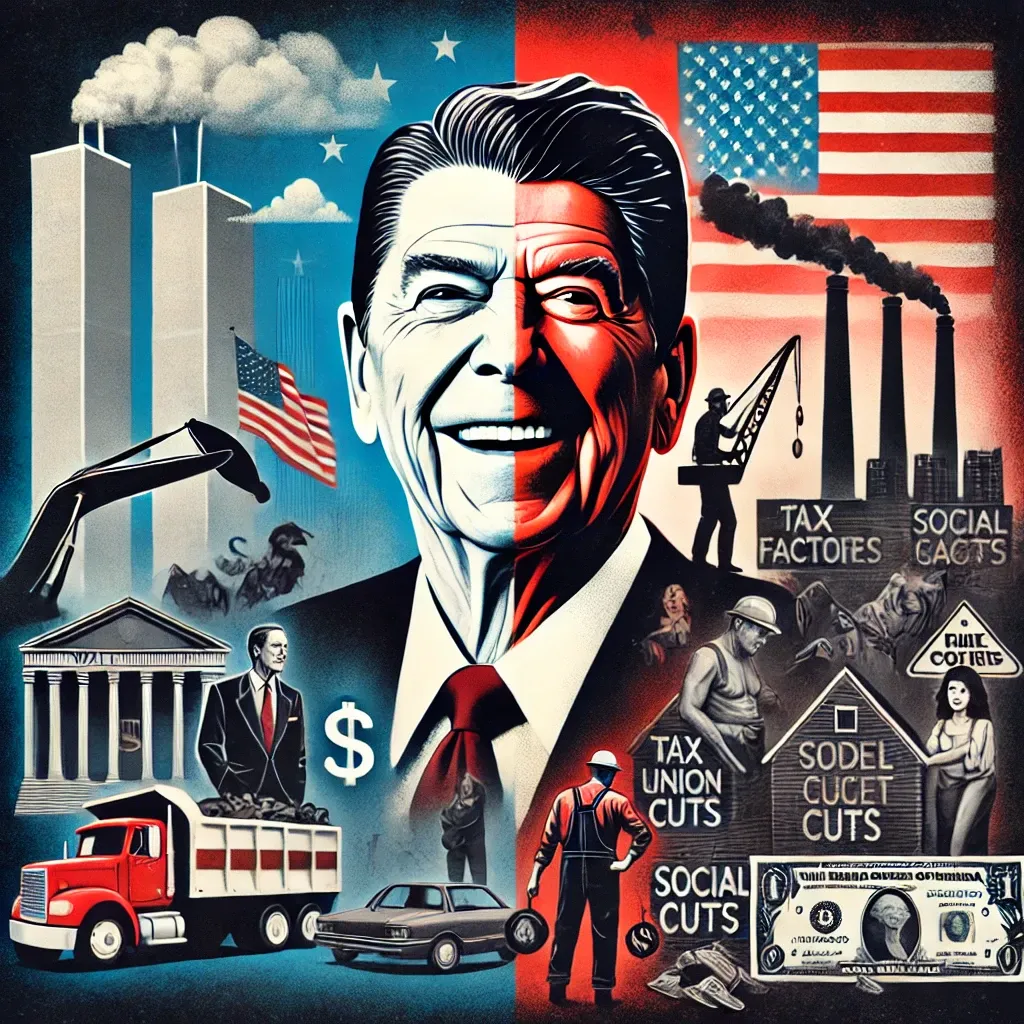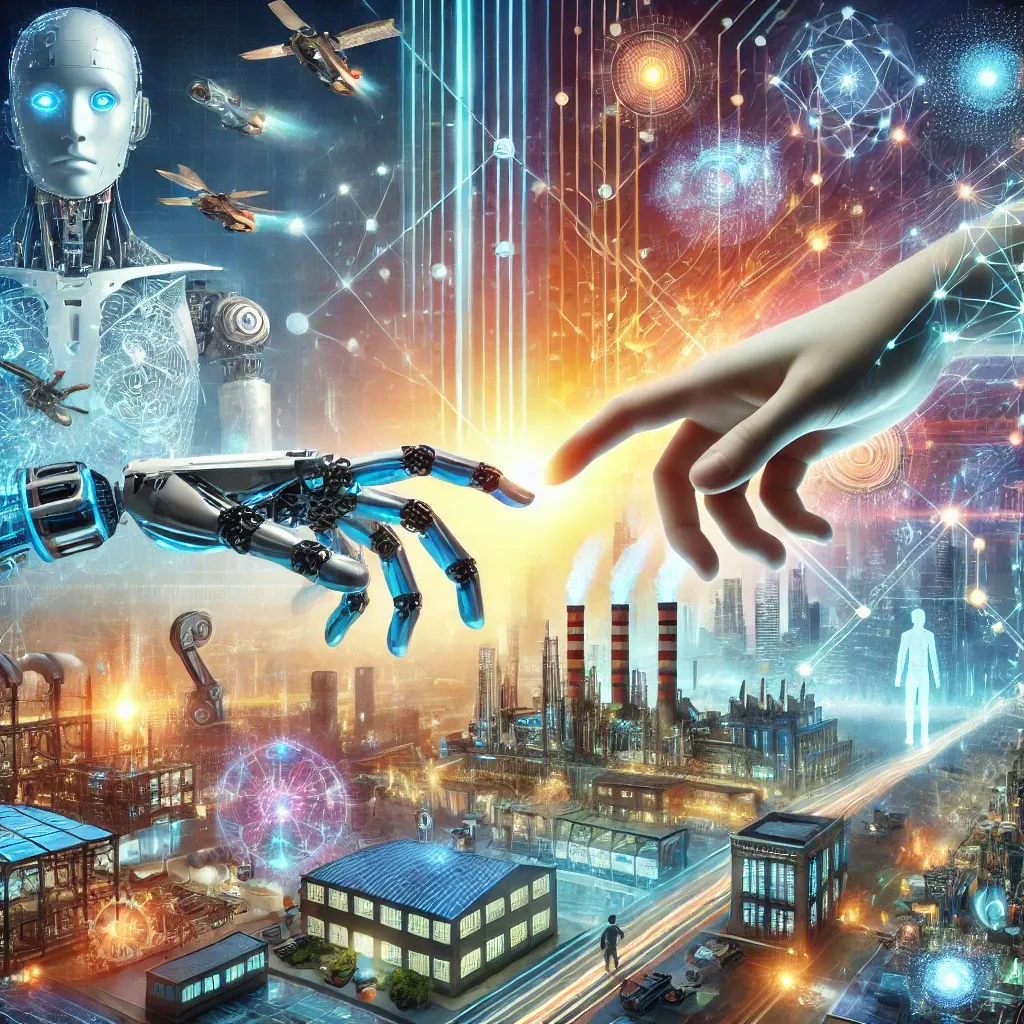Reagan and Neoliberalism
Explore the transition from Ronald Reagan's neoliberal policies to actionable solutions for a sustainable future in the Fourth Industrial Revolution.

Ronald Reagan's presidency marked a watershed moment in American politics, where neoliberalism became the dominant framework for governance. Reagan not only championed policies that aligned with the Powell Memo’s corporate-centric vision but also redefined the Republican Party and American political discourse. His administration institutionalized policies that prioritized corporate power, deregulation, and wealth concentration, profoundly impacting individuals and setting the stage for the extreme neoliberalism embraced by later administrations.
Reagan and Neoliberalism: The Architect of Modern Corporate Dominance
Reagan was heavily influenced by neoliberal thinkers like Milton Friedman and Friedrich Hayek, whose ideologies emphasized unregulated markets, privatization, and reduced government intervention. His presidency catalyzed a political and economic transformation that normalized these principles across party lines, establishing a corporate-first ethos that persists today.
Key Neoliberal Policies Under Reagan
Reagan’s policies consistently tilted the scales toward corporations and the wealthy, often at the expense of working-class Americans.
1. Tax Cuts Favoring the Wealthy
- Economic Recovery Tax Act (1981) and Tax Reform Act (1986):
- Reagan slashed the top marginal income tax rate from 70% to 28%, drastically reducing the tax burden on the wealthy and corporations.
- While these tax cuts were framed as promoting economic growth, they led to increased income inequality and ballooning federal deficits.
- Powell Memo Connection: This aligned with the Powell Memo's call to minimize corporate taxes and promote wealth accumulation among business leaders.
2. Deregulation Across Industries
Reagan’s deregulation agenda opened markets to corporate exploitation, often undermining public welfare:
- Airline Deregulation: Reduced oversight over the aviation industry, leading to cost-cutting measures that often compromised service and worker conditions.
- Telecommunications Deregulation: Paved the way for corporate consolidation, especially in media ownership.
- Environmental Deregulation: Reagan scaled back enforcement of environmental regulations, prioritizing corporate profits over sustainability.
- Financial Deregulation: Although some financial deregulation began under Carter, Reagan accelerated it, particularly in the Savings and Loan Industry, leading to a crisis that cost taxpayers $132 billion.
These measures directly implemented the Powell Memo’s strategy of limiting government control over business, giving corporations unrestrained power to dictate market conditions.
3. Anti-Union Policies
Reagan’s stance on labor was unequivocally anti-worker, a pivotal moment being:
- PATCO Strike (1981): Reagan’s firing of 11,000 striking air traffic controllers sent a chilling message to unions nationwide, emboldening corporations to undermine organized labor.
- Union membership plummeted under his administration, leading to a weakened bargaining power for workers and a decline in wages.
- Powell Memo Connection: The Powell Memo explicitly warned of labor unions as a threat to corporate power, and Reagan’s actions mirrored its recommendations to suppress collective labor rights.
4. Social Program Cuts
While lavishing corporations and the wealthy with tax breaks, Reagan cut funding for:
- Social Safety Nets: Programs like Medicaid, food stamps, and housing assistance saw significant reductions.
- Education: Federal funding for public education declined, increasing inequality in access to quality education.
- These austerity measures disproportionately hurt low-income Americans, further entrenching economic disparities.
Corporate Ties and Influence
Reagan’s administration was closely aligned with corporate interests, with many of his policies designed to benefit large businesses:
- Corporate Executives in Key Roles: Reagan appointed individuals from industries like oil, banking, and manufacturing to oversee regulatory agencies, ensuring corporate-friendly policies.
- Defense Contractors: Massive military spending under Reagan created a windfall for defense corporations like Lockheed Martin and Boeing, reinforcing the military-industrial complex.
- Wall Street Ties: Reagan’s policies fostered speculative financial practices that enriched Wall Street but destabilized the broader economy.
Cultural and Political Shifts
Reagan’s rhetoric and policies normalized the notion that government is the enemy of economic progress:
- “Government is not the solution to our problem; government is the problem”: This mantra undermined public trust in government institutions, paving the way for privatization and corporate-led solutions to public issues.
- Trickle-Down Economics: Reagan’s belief that wealth at the top would "trickle down" to the rest of society became a justification for policies that overwhelmingly benefited corporations and the wealthy.
Reagan’s Role in Moving the GOP (and Democrats) to the Right
Reagan’s presidency didn’t just entrench neoliberalism in the Republican Party—it also influenced Democrats:
- Bipartisan Acceptance of Neoliberalism: By the end of Reagan’s tenure, his neoliberal framework had become so dominant that Democrats like Bill Clinton adopted similar policies to remain politically viable.
- Push Toward Extremism: Reagan’s rightward shift of the GOP created a need for future Republican leaders to adopt even more extreme positions, fueling the culture wars and reactionary politics that dominate today.
Impact of the Powell Memo
The Powell Memo served as a blueprint for Reagan’s policies, encouraging corporate leaders to shape public opinion, infiltrate educational institutions, and lobby aggressively for pro-business policies. Reagan:
- Institutionalized Powell’s Vision: By enacting laws and appointing officials who prioritized corporate interests, Reagan institutionalized the corporate dominance Powell envisioned.
- Media Influence: Deregulation under Reagan allowed corporations to consolidate control over media outlets, ensuring a pro-business narrative dominated public discourse.
Conclusion: Reagan as the Harbinger of Neoliberal America
Ronald Reagan’s presidency marked the formal ascension of neoliberalism in American politics. His policies overwhelmingly benefited corporations while eroding labor rights, social welfare, and economic equality. By embedding Powell Memo principles into federal governance, Reagan created a political environment where corporate power overshadowed individual rights, setting the stage for the bipartisan embrace of neoliberalism and the far-right extremism that defines modern GOP politics. Reagan didn’t just push the Republican Party to the right—he redefined the entire political spectrum, leaving a legacy of corporate dominance and systemic inequality.
Reagan was not alone in this shift to Neoliberalism, he may have birthed the movement but Bill Clinton perfected it.

From Reaganomics to the Fourth Industrial Revolution: Reclaiming Our Future
The legacy of Ronald Reagan’s presidency marked the entrenchment of neoliberal policies, rooted in deregulation, privatization, and corporate power. Guided by the Powell Memo’s blueprint, Reagan institutionalized a system where markets superseded public welfare, unions were dismantled, and wealth was concentrated in the hands of a few. While this framework fueled short-term economic growth for the elite, it also sowed the seeds of systemic inequality, diminished social safety nets, and weakened democratic institutions.
Today, as we confront the Fourth Industrial Revolution, these neoliberal foundations have created a precarious landscape. AI and automation, the drivers of this new era, are exacerbating the inequalities birthed under Reaganomics. We now face a countdown to a post-labor economy, where millions of traditional jobs vanish, leaving most citizens unprepared and unsupported by the outdated systems shaped by neoliberalism.
The policies of the Reagan era not only shaped our economic past but also left us ill-equipped to navigate this technological upheaval. To avert a crisis where the majority are excluded from the benefits of progress, we must not only reverse the policies rooted in Reagan's neoliberal vision but also lay the groundwork for a radically different economic and social order. By addressing the core tenets of neoliberalism and preparing for the unique challenges of AI-driven transformation, we can create a future that values human dignity, equity, and innovation over unchecked corporate power.
The Fourth Industrial Revolution, driven by artificial intelligence (AI) and automation, is reshaping economies and societies faster than most policies can adapt. As the exponential growth of AI displaces jobs across industries, we are left playing a dangerous game of musical chairs, where the chairs—stable, meaningful employment—are vanishing. The neoliberal policies that have dominated for decades are ill-equipped to handle this shift, as they prioritize deregulation, privatization, and corporate dominance over equitable solutions for humanity.
If we are to reclaim the future and build a society where human dignity, innovation, and fairness prevail, we must focus on dismantling the core tenets of neoliberalism. Here are three transformative steps that address the roots of neoliberalism and prepare for a radically different world:
1. Reclaim the Commons: Democratize Wealth and Resources
Problem: Neoliberal policies concentrate wealth and resources in the hands of corporations, undermining public good and perpetuating inequality. This model is unsustainable in a world where automation drastically reduces the need for human labor.
Solution: Nationalize or socialize essential infrastructure and resources to ensure equitable access, while creating frameworks for decentralized, community-driven production.
- Universal Basic Services (UBS): Guarantee access to healthcare, education, housing, and public utilities. By removing profit motives from basic needs, we ensure a foundation for all citizens to thrive, regardless of job displacement.
- Commons-Based Production: Support local, cooperative workshops where individuals can use advanced tools (3D printers, CNC machines) for personal and community projects. This decentralizes production, empowering individuals to innovate and adapt.
- Wealth Redistribution: Establish progressive wealth taxes and sovereign wealth funds to redistribute gains from automation and AI to the population at large, ensuring that productivity improvements benefit everyone.
Core Principle: Shift ownership of critical systems from corporations to people, removing the profit incentives that drive neoliberal exploitation.
2. Reform the Economic Framework: UBI and the Future of Work
Problem: Neoliberalism’s dependence on labor exploitation falters in an era where AI-driven automation dominates production, leading to mass unemployment and instability.
Solution: Redefine work and income in ways that align with a post-labor economy.
- Universal Basic Income (UBI): Provide a guaranteed income to all citizens, ensuring economic stability even as traditional jobs disappear. This not only cushions the transition to a post-work society but also empowers people to pursue creative, educational, or entrepreneurial endeavors.
- Human-Centered Work: Invest in sectors that require human creativity, empathy, and uniqueness, such as arts, caregiving, environmental restoration, and community-building.
- Tax Automation: Implement a "robot tax" or levy on AI and automation systems that replace human workers. Use the proceeds to fund UBI and public goods.
Core Principle: Decouple human dignity from employment by ensuring income security and promoting meaningful, human-centric work.
3. Reinvent Education: Prepare for a Post-Industrial Society
Problem: The current educational system, designed for an industrial economy, is obsolete in preparing individuals for a future where most production is automated and the job market prioritizes adaptability, creativity, and critical thinking.
Solution: Create a lifelong, adaptive education system that focuses on human skills over rote learning.
- Critical Thinking and Creativity: Replace standardized testing and industrial-age curricula with programs emphasizing critical thinking, problem-solving, ethics, and adaptability.
- Personal Workshops and Maker Spaces: Equip communities with public "maker spaces" where individuals can learn and use advanced tools for prototyping, production, and experimentation.
- AI and Ethics Training: Make AI literacy and ethical reasoning foundational to all education. This ensures the population understands and can engage with the technologies reshaping their world.
- Lifelong Learning Accounts: Provide citizens with government-funded accounts for continuous skill development, allowing them to learn new trades or pursue creative passions throughout their lives.
Core Principle: Build an education system that fosters human uniqueness, making people the architects of innovation rather than victims of obsolescence.
Why This Matters Now: The Countdown
The Fourth Industrial Revolution waits for no one. Every year, AI advances exponentially, displacing millions of jobs in manufacturing, transportation, customer service, and even creative fields. Without immediate action, neoliberalism's laissez-faire approach will leave the majority behind, concentrating power and wealth in the hands of a few AI-driven corporations. The result? Economic collapse, social unrest, and the erosion of democracy.
By reversing neoliberalism through these three core policies—reclaiming the commons, ensuring economic security, and reinventing education—we can prepare for this seismic shift. The goal isn’t to preserve the status quo but to embrace a new paradigm where technology serves humanity, not the other way around. This is not just reform; it’s survival.
